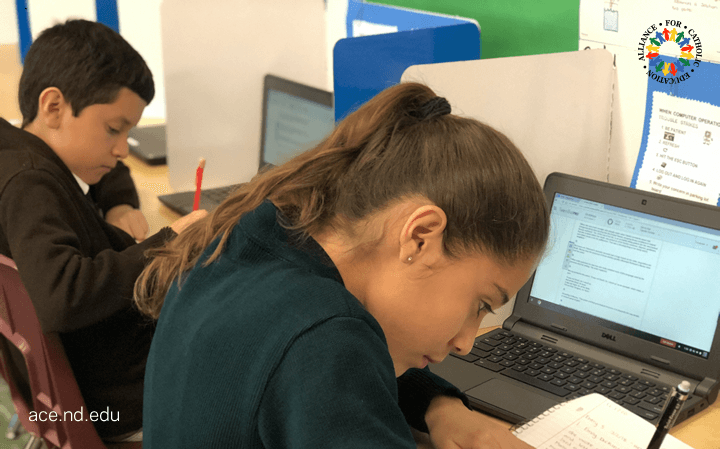Would you believe me if I told you that the director of instructional technology for the nation's largest archdiocese presented at our Blended Learning in Catholic Schools Symposium and hardly ever mentioned technology?
That's right, folks. Even directors of instructional technology are looking beyond technology itself to identify the student and teacher practices that allow technology to have a transformative impact on learning.
To build on our last post about personalizing learning without technology, today we are sharing three foundational principles for personalized learning that Dr. John Reyes, the director of educational technology for the Archdiocese of Los Angeles, shared at the Symposium in March.
 John's session was originally going to be about achieving the right balance between personalization and standardization in blended-learning classrooms, but after working on his presentation, he decided to focus on the principles underlying personalized learning. "I realized that it would be impossible to have a fruitful conversation about personalization without first identifying the skills students need for it to be successful," John explained. "In many instances, we err on the side of caution and take a more standardized approach because students don't have the skills they need to have authentic, impactful personalized learning experiences, not because a more standardized approach is actually the best for students."
John's session was originally going to be about achieving the right balance between personalization and standardization in blended-learning classrooms, but after working on his presentation, he decided to focus on the principles underlying personalized learning. "I realized that it would be impossible to have a fruitful conversation about personalization without first identifying the skills students need for it to be successful," John explained. "In many instances, we err on the side of caution and take a more standardized approach because students don't have the skills they need to have authentic, impactful personalized learning experiences, not because a more standardized approach is actually the best for students."
Most of us know that there are many valid criticisms of personalized learning, one of which is that students will not make the best decisions for their own learning if left to their own devices. And this is true, even for adults: if we have ever taken the time to engage in an intensive process of self-reflection, it still isn't likely that we have effectively identified what we need to learn and dedicated ourselves to it. Most of us learn about the things we want to learn about, or watch Netflix, or fall asleep instead....
"We can't expect anything different from ourselves or from students," John explained, "unless we deliberately foster the skills of self-efficacy, self-agency, and self-direction." Learners need:
- Self-efficacy: to believe in their ability to succeed in certain situations or accomplish specific tasks.
- Self-agency: to understand how to make intentional, informed learning decisions.
- Self-direction: the freedom to make their own effective and informed learning decisions.
We cannot expect students to enter classrooms with these skills, and we certainly can't expect that the freedom to make choices in their own learning will automatically lead students to make the best choices.
Unfortunately, though, very few schools are intentionally building these skills so that students have a successful personalized learning experience. "I have a hypothesis that the reason schools aren't focusing on these skills is due to a syndrome of perceived expertise," John said. "A lot of people learn just enough about personalized learning to think they know everything, but the truth is we often underestimate or overestimate students' ability to handle this newfound freedom." In many cases, when we offer opportunities for student "choice," we do so in a way that is insignificant (that is, it doesn't respond to an authentic student need) or that is so broad that it may detract from meaningful learning experiences.
Instead of simply throwing up our hands and declaring personalized learning an impossible task, though, John encourages teachers and leaders to think about how they can gradually and deliberately foster self-efficacy, self-agency, and self-direction in students. John led us in this process at the Symposium, where we collaborated to articulate what each of these skills involved and how we might build a progression towards mastery of them. It's not going to be an easy or quick process, but it will be critical to the success of blended-learning programs in our schools.



Now we want to hear from you! Have you taken steps to foster these skills in your students? Let us know in the comments below!
We are so grateful to John for his leadership at the Symposium and in our community more broadly. If you would like to hear more from John, you can find him on twitter @john_reyes.
 Alliance for Catholic Education
Alliance for Catholic Education
